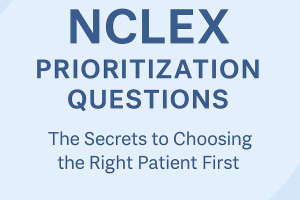Sleep or Study? The Best Night-Before-Exam Strategy

The night before your NCLEX exam can bring a mix of nerves, last-minute doubts, and a temptation to cram. But what should you actually do the night before? Should you stay up and review one last time, or should you prioritize rest?
The answer isn’t always one-size-fits-all, but research and expert recommendations point clearly in one direction: sleep trumps cramming—every time.
Let’s break down the best strategy to follow the night before your NCLEX.
Why Sleep Matters More Than Last-Minute Studying
Your brain needs time to consolidate information, and that happens during sleep. Sleep helps move short-term memory (what you just studied) into long-term memory (what you can retrieve during the test).
Effects of Poor Sleep on Exam Day:
- Reduced concentration
- Slower reaction time
- Impaired judgment
- Increased anxiety
- Lower test performance
Even just one night of poor sleep can significantly impact how your brain processes information under pressure.
The Science Behind It
A study published in Nature Reviews Neuroscience found that sleep enhances memory encoding, consolidation, and retrieval. In simple terms, if you don’t sleep, your brain doesn’t absorb or recall information efficiently—no matter how hard you studied the night before.
So, if you’ve been preparing effectively in the weeks before your exam, the night before is not the time to cram, but to recharge.
What You SHOULD Do the Night Before the NCLEX
1. Stop Studying by 6 PM
Avoid opening textbooks or practice questions late at night. Give your brain time to relax and start winding down. Trust the work you’ve already done.
2. Pack What You Need
- ID card
- Authorization to Test (ATT) email/printout
- Directions to the testing center
- A bottle of water and a light snack
- Face mask (if required)
Having everything ready removes unnecessary stress in the morning.
3. Eat a Balanced Dinner
Avoid heavy or greasy foods. Eat something nourishing that won’t disrupt your sleep—think protein, complex carbs, and greens.
4. Do a Light Review (Optional)
If you must look at something, skim through a 1-page formula sheet, lab values, or flashcards for no more than 15–20 minutes. Focus only on what you’re already comfortable with—no new material.
5. Practice Mindfulness or Relaxation
Deep breathing, meditation, prayer, or even stretching can calm nerves and improve sleep quality. Avoid anything that raises your anxiety (like NCLEX Reddit threads or forums).
6. Limit Screen Time
Turn off screens (especially social media) an hour before bed. The blue light interferes with melatonin production and can delay sleep.
7. Go to Bed Early
Aim to be in bed by 9 or 10 PM. Even if you don’t fall asleep immediately, being in a quiet, dark room will help your body wind down.
What NOT to Do the Night Before the NCLEX
- Don’t start a new topic you haven’t reviewed yet
- Don’t do a full-length practice exam
- Don’t compare yourself to other students
- Don’t drink too much caffeine or energy drinks
- Don’t plan to “wing it” without sleep
Morning-Of Tip
When you wake up, remind yourself: “I’ve studied. I’m ready. I’m calm.” This mindset, combined with a well-rested brain, will help you perform at your highest level.
Final Takeaway
The best thing you can do the night before your NCLEX is to protect your mental and physical energy. You’ve worked hard to prepare—now let your brain do its job.
Choose rest over cramming, calm over chaos, and confidence over panic.
Sleep is your best final study session. Use it wisely.






